You’re Not Alone
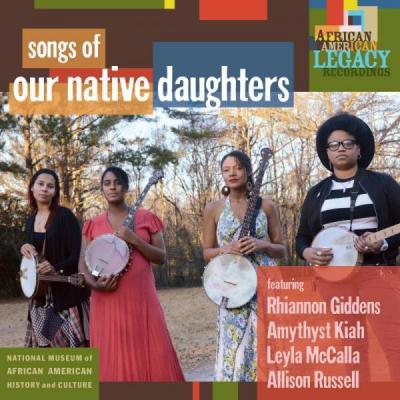
Songs of our Native Daughters (Smithsonian Folkways, 2019)
Allison Russell, vocals and 5-string banjo;
Rhiannon Giddens, backing vocals and minstrel banjo;
Leyla McCalla, cello;
Jamie Dick, drums and percussion;
Dirk Powell, accordion, piano, keys, electric guitar, and bass
Russell è, invece, la prima voce nella ballata “You’re Not Alone”, dichiarazione della forza della consapevolezza comune, un omaggio alla resilienza delle antenate da parte delle quattro Native Daughters, che chiude questo capo d’opera.
blogfoolk.com
I became a mother to my daughter Ida Maeve almost five years ago. She’s been on the road with her dad and me since she was four weeks old. Nobody warned us about the unending fear and worry that attached to the deepest, truest love known to human- kind—and yet never had I felt more pow- erful and more connected to the ancestors than I did in giving birth to my... (Continues)
Allison Russell, vocals and 5-string banjo;
Rhiannon Giddens, backing vocals and minstrel banjo;
Leyla McCalla, cello;
Jamie Dick, drums and percussion;
Dirk Powell, accordion, piano, keys, electric guitar, and bass
Russell è, invece, la prima voce nella ballata “You’re Not Alone”, dichiarazione della forza della consapevolezza comune, un omaggio alla resilienza delle antenate da parte delle quattro Native Daughters, che chiude questo capo d’opera.
blogfoolk.com
I became a mother to my daughter Ida Maeve almost five years ago. She’s been on the road with her dad and me since she was four weeks old. Nobody warned us about the unending fear and worry that attached to the deepest, truest love known to human- kind—and yet never had I felt more pow- erful and more connected to the ancestors than I did in giving birth to my... (Continues)
Hey, my little evening star
(Continues)
(Continues)
Contributed by Dq82 2019/4/13 - 18:09
Blood and Bones

Songs of our Native Daughters (Smithsonian Folkways, 2019)
Amythyst Kiah, vocals, 5-string banjo, and percussion;
Rhiannon Giddens, backing vocals, minstrel banjo, and percussion;
Allison Russell, percussion;
Jamie Dick, drums and percussion;
Dirk Powell, electric guitar and percussion;
Jason Sypher, bass and percussion
La voce di Kiah diventa ancora protagonista in “Blood and Bones” scritta di suo pugno.
blogfoolk.com
The chorus to this song had been floating around in my head, given life by my voice and banjo, but it didn’t really have a home in a song. I wrote it not long after reading reports and watching videos of white nationalists feeling more confident about asserting their views after the election of Donald Trump in 2016. There’s “not enough steel to reconcile” our humanity and our sense of selves. The verses were inspired by both a photo I saw of a black slave child... (Continues)
Amythyst Kiah, vocals, 5-string banjo, and percussion;
Rhiannon Giddens, backing vocals, minstrel banjo, and percussion;
Allison Russell, percussion;
Jamie Dick, drums and percussion;
Dirk Powell, electric guitar and percussion;
Jason Sypher, bass and percussion
La voce di Kiah diventa ancora protagonista in “Blood and Bones” scritta di suo pugno.
blogfoolk.com
The chorus to this song had been floating around in my head, given life by my voice and banjo, but it didn’t really have a home in a song. I wrote it not long after reading reports and watching videos of white nationalists feeling more confident about asserting their views after the election of Donald Trump in 2016. There’s “not enough steel to reconcile” our humanity and our sense of selves. The verses were inspired by both a photo I saw of a black slave child... (Continues)
Blood and bones are what we're made of
(Continues)
(Continues)
Contributed by Dq82 2019/4/13 - 18:03
Slave Driver

Rhiannon Giddens, Amythyst Kiah, Leyla McCalla, Allison Russell
Songs of our Native Daughters (Smithsonian Folkways, 2019)
Rhiannon Giddens, vocals and minstrel banjo;
Amythyst Kiah, vocals;
Allison Russell, vocals;
Leyla McCalla, vocals;
Dirk Powell, guitar and electric guitar;
Jason Sypher, bass
L’unica cover presente nel disco è “Slave Driver” di Bob Marley, l’artista resistente per eccellenza, proposta in un bell’adattamento.
blogfoolk.com
Here we honor a man who used music as his weapon in the battle for human rights. Bob Marley sang about spirituality and sensuality, but also about militant resistance to oppression. His message, in total, was uni- fied—he was, in the words of his wife Rita, “a revolutionary.” Like Martin Luther King, his militancy has been whitewashed in the years since his death. But this song is more relevant than ever, not only for stating the... (Continues)
Songs of our Native Daughters (Smithsonian Folkways, 2019)
Rhiannon Giddens, vocals and minstrel banjo;
Amythyst Kiah, vocals;
Allison Russell, vocals;
Leyla McCalla, vocals;
Dirk Powell, guitar and electric guitar;
Jason Sypher, bass
L’unica cover presente nel disco è “Slave Driver” di Bob Marley, l’artista resistente per eccellenza, proposta in un bell’adattamento.
blogfoolk.com
Here we honor a man who used music as his weapon in the battle for human rights. Bob Marley sang about spirituality and sensuality, but also about militant resistance to oppression. His message, in total, was uni- fied—he was, in the words of his wife Rita, “a revolutionary.” Like Martin Luther King, his militancy has been whitewashed in the years since his death. But this song is more relevant than ever, not only for stating the... (Continues)
Dq82 2019/4/13 - 17:48
Black Myself
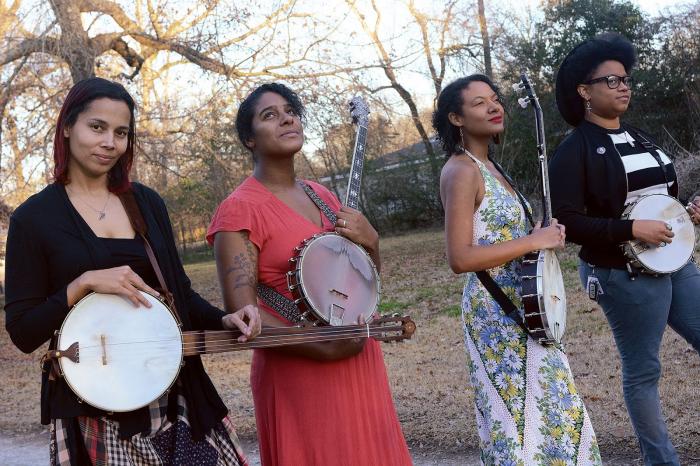
Songs of our Native Daughters (Smithsonian Folkways, 2019)
Amythyst Kiah, vocals and guitar;
Rhiannon Giddens, backing vocals and minstrel banjo;
Leyla McCalla, backing vocals;
Allison Russell, backing vocals;
Jamie Dick, drums and percussion;
Dirk Powell, electric guitar and accordion;
Jason Sypher, bass
Dai versi finali della stessa “John Henry”, nella versione del “musicista delle colline” Sid Hemphill, il bluesman compositore e pluristrumentista registrato da Alan Lomax, arriva il titolo del R&B di apertura, “Black Myself”, scritto da Kiah, la più giovane del quartetto, esponente del alt-country blues, nativa del Tennessee, che lo interpreta con la sua voce soul.
blogfoolk.com
This song was inspired by a line from north Mississippi hill country musician Sid Hemphill’s “John Henry:”
I don’t like no red-black woman Black myself, black myself
This sentiment is linked... (Continues)
Amythyst Kiah, vocals and guitar;
Rhiannon Giddens, backing vocals and minstrel banjo;
Leyla McCalla, backing vocals;
Allison Russell, backing vocals;
Jamie Dick, drums and percussion;
Dirk Powell, electric guitar and accordion;
Jason Sypher, bass
Dai versi finali della stessa “John Henry”, nella versione del “musicista delle colline” Sid Hemphill, il bluesman compositore e pluristrumentista registrato da Alan Lomax, arriva il titolo del R&B di apertura, “Black Myself”, scritto da Kiah, la più giovane del quartetto, esponente del alt-country blues, nativa del Tennessee, che lo interpreta con la sua voce soul.
blogfoolk.com
This song was inspired by a line from north Mississippi hill country musician Sid Hemphill’s “John Henry:”
I don’t like no red-black woman Black myself, black myself
This sentiment is linked... (Continues)
I wanna jump the fence and wash my face in the creek
(Continues)
(Continues)
Contributed by Dq82 2019/4/12 - 11:34
Song Itineraries:
Racism and Slavery in the USA
Polly Ann's Hammer
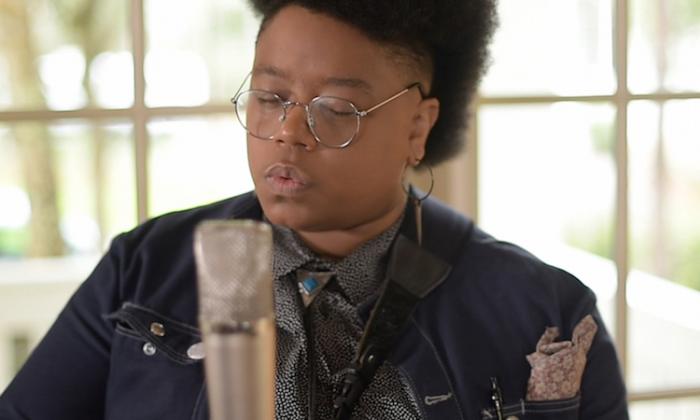
Songs of our Native Daughters (Smithsonian Folkways, 2019)
Amythyst Kiah, vocals and 5-string banjo;
Rhiannon Giddens, backing vocals and fiddle;
Jamie Dick, drums;
Dirk Powell, guitar;
Jason Sypher, bass
Per capire meglio in cosa consistano riappropriazione e rovesciamento di punti di vista, partiamo dagli stilemi folk di “Polly Ann’s Hammer” – guidata dal violino di Giddens – che riscrive il tradizionale “John Henry”, storica protest song sullo sfruttamento dei lavoratori, qui centrata sulla vedova di John, che appare nella parte finale della canzone originale («John Henry had a woman / Well her name was Polly Ann /Well John Henry took sick and he had to go to bed / Well and Polly drove steel like a man (well, well)/ Well and Polly drove steel like a man»). Nella riscrittura delle Daughters, Polly si appropria del martello con cui è stato ha ucciso il marito e ne fa un simbolo... (Continues)
Amythyst Kiah, vocals and 5-string banjo;
Rhiannon Giddens, backing vocals and fiddle;
Jamie Dick, drums;
Dirk Powell, guitar;
Jason Sypher, bass
Per capire meglio in cosa consistano riappropriazione e rovesciamento di punti di vista, partiamo dagli stilemi folk di “Polly Ann’s Hammer” – guidata dal violino di Giddens – che riscrive il tradizionale “John Henry”, storica protest song sullo sfruttamento dei lavoratori, qui centrata sulla vedova di John, che appare nella parte finale della canzone originale («John Henry had a woman / Well her name was Polly Ann /Well John Henry took sick and he had to go to bed / Well and Polly drove steel like a man (well, well)/ Well and Polly drove steel like a man»). Nella riscrittura delle Daughters, Polly si appropria del martello con cui è stato ha ucciso il marito e ne fa un simbolo... (Continues)
John Henry had a woman
(Continues)
(Continues)
Contributed by Dq82 2019/4/12 - 11:23
×
![]()

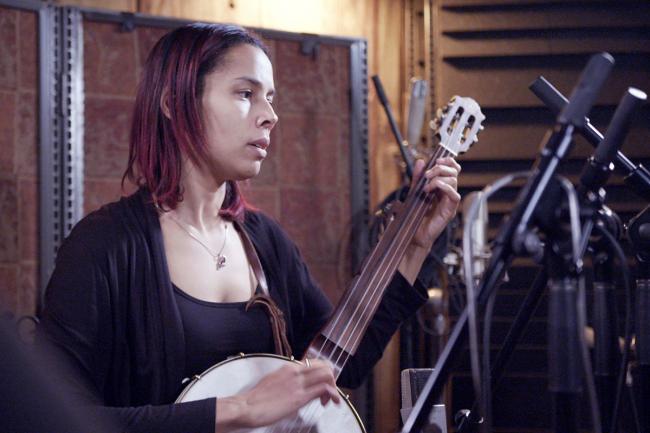
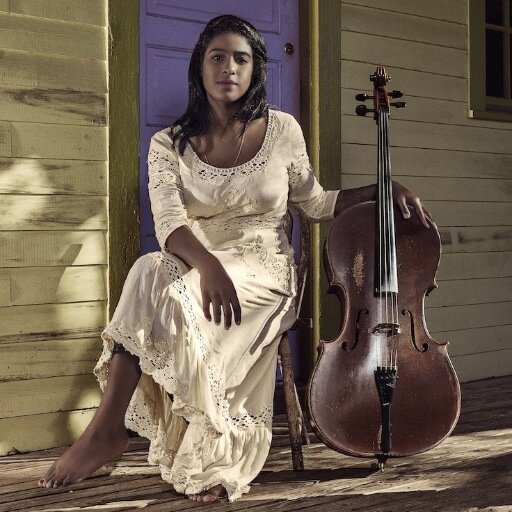
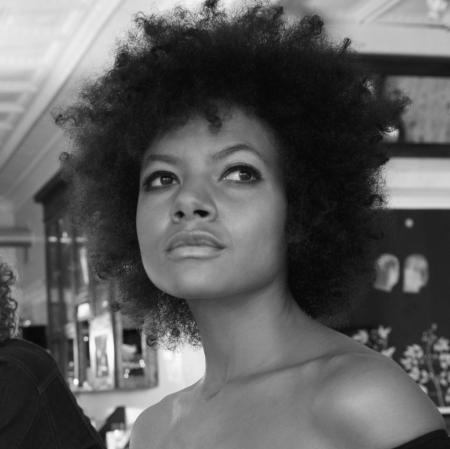
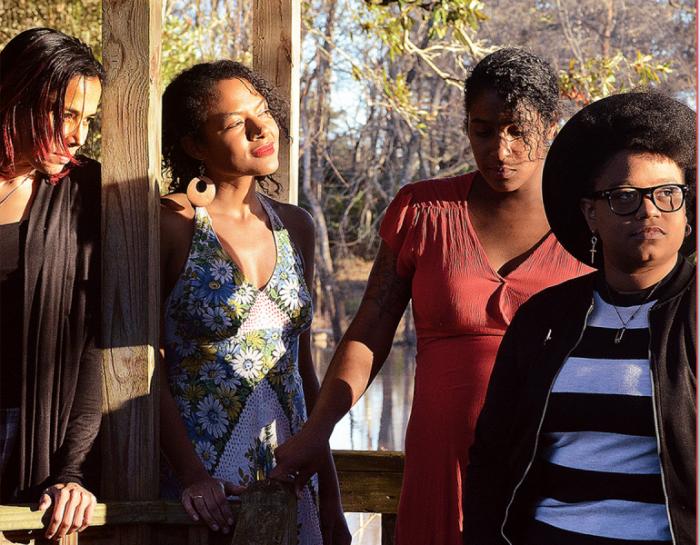
Rhiannon Giddens, vocals and minstrel banjo;
Jamie Dick, percussion;
Dirk Powell, fiddle;
Jason Sypher, bass
La melodia di “Better Git Yer Learnin’ è attribuita al banjoista ottocentesco Thomas F. Briggs, ma al testo originario, pieno di luridi stereotipi razzisti, le nostre hanno sostituto liriche considerando il punto di vista di uno schiavo emancipato.
blogfoolk.com
The tune for this song is attributed to the banjo performer Thomas F. Briggs, found in a banjo method book published in 1855 entitled Briggs’ Banjo Instructor. It provides an early glimpse into that first truly American cultural sensation, the minstrel show. These tunes were published with no words, which gave me the opportunity to engage with them as pieces of music with no baggage. After learning quite a few, I braced myself to read the original lyrics,... (Continues)